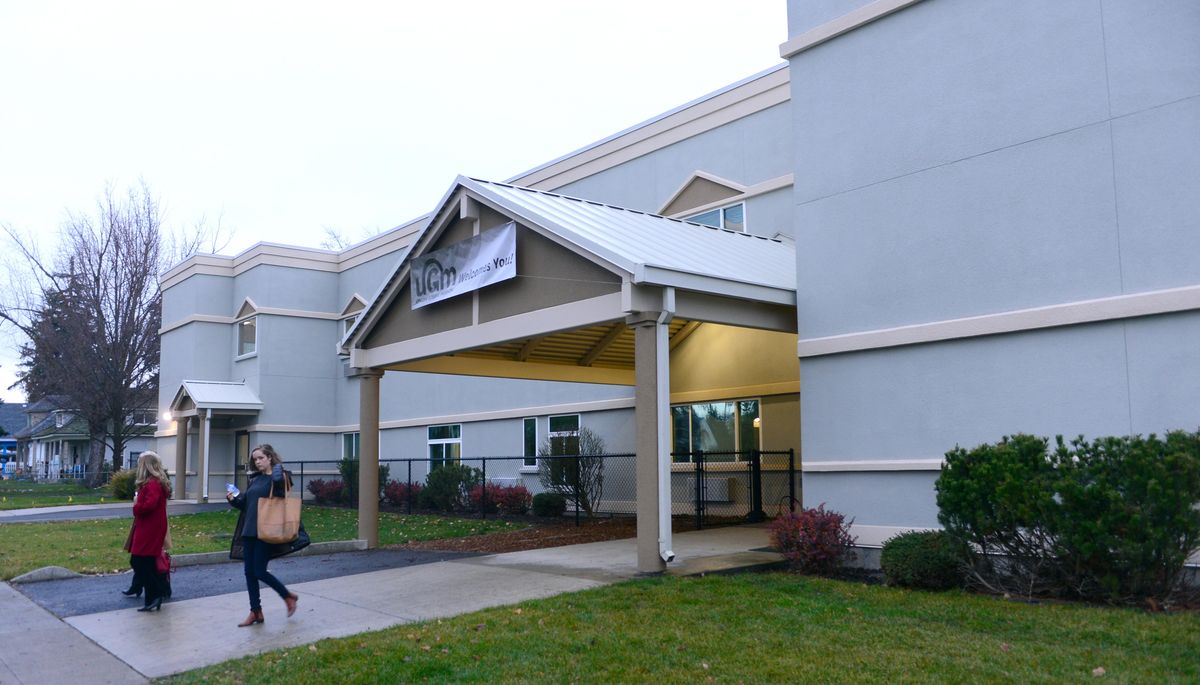Union Gospel Mission to open new crisis shelter for women and children

An old motel on East Sprague Avenue has never been the best place for a crisis shelter.
Surrounded by a busy arterial, a bikini barista stand and the Hells Angels clubhouse, the Union Gospel Mission shelter for women and children in crisis is overflowing and sometimes has three families living in a single motel room.
“It’s the one facility I was not proud of,” said UGM executive director Phil Altmeyer.
Later this month, the women and children who rely on the shelter will have a brand-new home in a 30,000-square-foot shelter at the intersection of Illinois Avenue and Hogan Street.
UGM hosted a ribbon-cutting at the former nursing home Wednesday.
The new facility has 34 bedrooms with capacity for 134 people. Unlike the old motel, it also has common areas, including a dining room, indoor playroom for children and computer lab for women to job hunt or search for housing.
Many of the women who come to the shelter are fleeing domestic violence, Community Engagement Director Dave Wall said. He said recently, a woman came in to the existing shelter with her fourth-grade daughter. The girl’s father had broken her finger in a rage earlier that night.
As is typical, the shelter was full, leading staff to open up an overflow room where mattresses were squeezed together on the floor.
“She was trying to decide if she spent the night there or went back home,” Wall said. Ultimately, the woman decided to leave, but ended up coming back the next night.
In the new space, UGM hopes to give each woman with children her own room. Communal spaces will provide a more home-like atmosphere, and women will be able to eat family-style, rather than huddled around a makeshift table in individual motel rooms.
Smaller rooms are designed for a single mother with children, while larger rooms have multiple bunk beds to house women with no children.
Outside, there’s a fenced grassy area with a play structure for children. A medical clinic upstairs will be able to treat minor illnesses and injuries so women without insurance don’t rack up huge bills by going to the emergency room.
UGM bought the building for $2 million earlier this year and spent about a half-million dollars renovating it, Altmeyer said. Most of the renovations were minor since the floor plan was well-suited to a shelter space.
“It’s almost like it was designed for us,” Altmeyer said.
Women currently staying at the East Sprague building should be able to move in by Christmas.
Unlike many other services for homeless people, UGM relies only on private donations and does not take local government or federal money.
The organization’s approach to housing differs from the housing-first model favored by Catholic Charities, which opened a large apartment building earlier this year to house chronically homeless people. UGM focuses more on a person’s spiritual life and requires its facilities to be clean and sober, Altmeyer said.
People who use its crisis shelters are directed into either a job training program or a faith-based recovery program for drug and alcohol addiction.
“We really focus on every aspect of a person’s life,” Altmeyer said. “You’ve got to deal with the individual, not just the house.”
Many of the bedrooms in the new shelter were sponsored by local churches, families and other groups.
Dennis Olson toured the shelter Wednesday with Altmeyer. Olson’s church, Valley Assembly of God, raised $5,000 for one room. Leaders were so happy with the outcome they put out a plea at a church service and were able to raise another $11,500 in one day, Olson said.
He said of church members, “They don’t pull their wallets out unless they really know” the money is going to support something important.
The additional money went to dedicating a second room to John Goodrich, a church member who sat on the UGM board and died suddenly of a heart attack earlier this year.
Olson’s wife, Sharon, works with a church quilting group that donated quilts to furnish the rooms.
Wall, UGM’s community engagement director, warned her the quilts have a tendency to walk off the shelter grounds.
“Sometimes they disappear, just so you know. The women get attached,” Wall said.
People often don’t realize how many women are homeless because they often have children with them and don’t usually spend time on the streets.
“People still think of homelessness as being all about men,” Wall said. But UGM shelters serve more women. Last year, the Spokane crisis shelter housed 1,636 people for a total of 31,779 nights.
When UGM opened the Sprague shelter in 2006, it housed an average of 47 people per night, Altmeyer said. That’s now grown to over 100 people.
“Now we have a place to take a deep breath and take care of them,” he said.